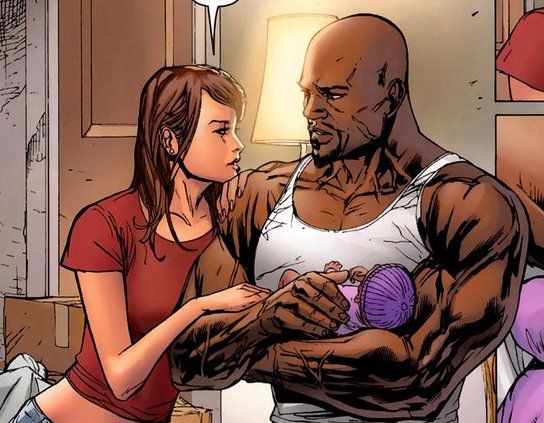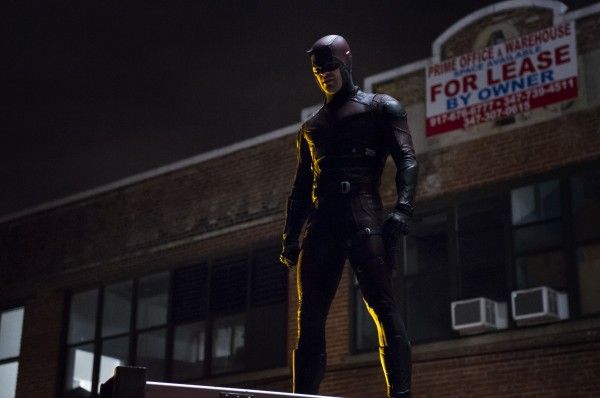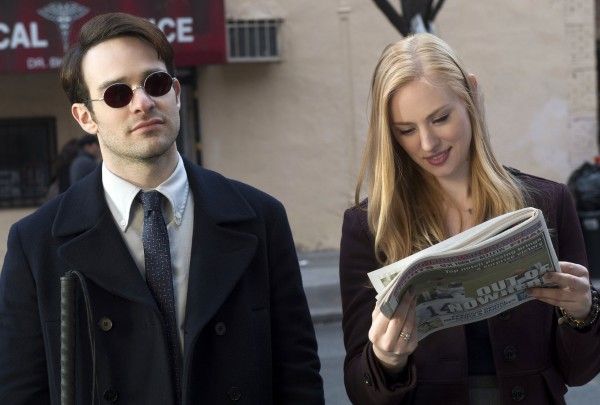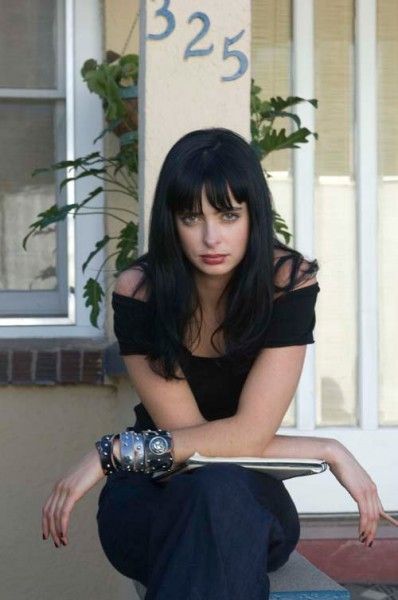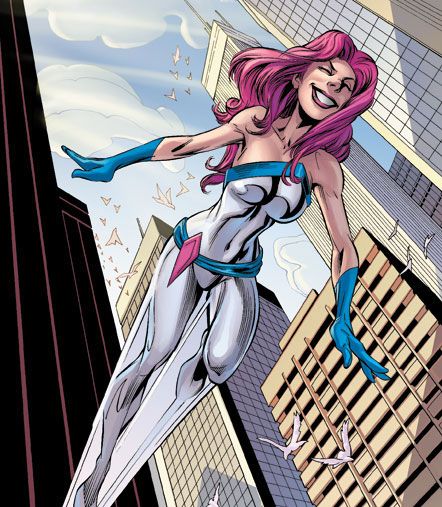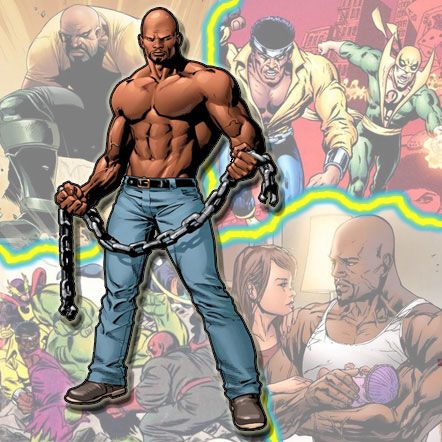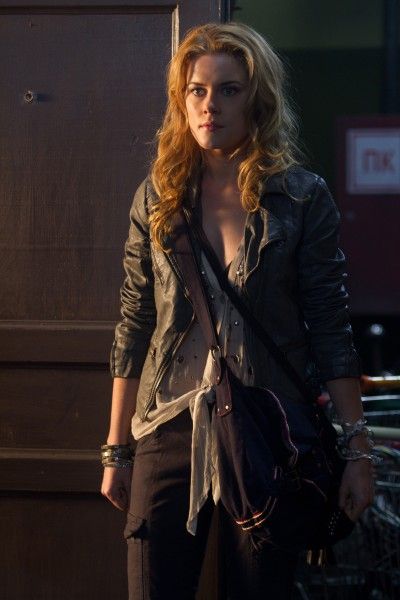As part of the Netflix portion of the TCA Press Tour, there was a showrunners panel to discuss a handful of their original programming, both comedy and drama, and give insight into the collaborative process and how its often very different from the networks. After that discussion, Collider was able to sit down with Jessica Jones showrunner Melissa Rosenberg and Marvel TV’s Jeph Loeb for a roundtable where we got some further details about the upcoming 13-episode Marvel series.
During the interview, Melissa Rosenberg and Jeph Loeb talked about how the show evolved from ABC to Netflix into something that is entirely different, what makes Jessica Jones stand on its own, the tonal differences from Daredevil, how they’re approaching the action and violence, what you can expect from this show’s villain, the casting choices, the private investigator aspect, Jessica Jones’ character motivations, how Luke Cage fits in, and the female friendship element.
Question: Melissa, you started developing this a long time ago with ABC. When it came back to life at Netflix, did you start over from scratch, or did you take any elements from that version?
MELISSA ROSENBERG: I was so hoping that it would just be adjusting to the network. It was a page one do-over. They’re such different mediums that it’s completely different storytelling.
LOEB: From a Marvel point of view, Jessica Jones was the first thing that Marvel Television developed, so you have to go back to where we were. It was 2010 and we had made a couple of movies, along the way. The entire Avengers initiative hadn’t really gone through, but we knew that’s what we were doing. Making the decision to stay in the Marvel Cinematic Universe made significant chances to what we were going to do, just starting from a place of what characters were available to us, and all of the things we talk about all the time, when we talk about S.H.I.E.L.D. Is there a way to tell the story and still remain true to the larger continuity that we’re telling? One of the things that Mel embraced and really got was what we refer to as continuity through omission. We accept that those things are there, but we don’t want anyone to think, “Oh, drat, I missed Iron Man by four seconds. If I had just being looking up at the sky.”
What makes Jessica Jones Jessica Jones is that it stands on its own. It lives in this world that we’ve created of Hell’s Kitchen and New York City, and it’s grounded, and she’s a real woman with real problems, and Melissa’s voice comes through in a way that Netflix not only allows to happen, but also really speaks to a different kind of story than the story we were originally telling. In many ways, it’s so funny that you bring it up because I don’t think about when we had developed it before. The best thing that came out of it was this partnership and the fact that we would just keep talking to each other periodically. I would keep saying to her, “Imagine that there’s going to come a day when we’re going to be at a place where you can tell the story the way you originally intended to tell the story.” We make no secret about it, it’s based on material that’s much more mature.
ROSENBERG: He was much more mysterious than that. Every three months, I’d get a call while I was on the set of some other show and he’d be like, “Are you available? Are you ready? Something is happening.” “What’s happening, Jeph?” “I’ll get back to you in a week.” And then, it would be another three months. I swear, this happened for two years. And then, he called and said, “If the press calls you, just tell them that you don’t know anything.” I was like, “I really don’t! What’s happening?!” And then, I found out it was this incredible thing that Marvel had built with Netflix. If I could imagine the best case scenario, I got it.
What are the tonal differences between Jessica Jones and Daredevil?
ROSENBERG: It really comes down to the characters. They’re very different kinds of characters. Jessica is about paying rent and getting the next client. She’s dealing with a fairly dark past. She’s trying to get through the day. She’s not really trying to save the city. She’s trying to save her apartment. At her core, she does share something with Matt Murdock, and he’s a little more aware of it, that she wants to do something good. She wants to contribute to the world. But, there are a lot of personality issues for her that can get in the way.
How will the action, the action sequences and the level of violence compare to what we saw in Daredevil?
ROSENBERG: Matt Murdock has been studying martial arts. He has extraordinary fighting skills. Jessica Jones is a brawler. She gets drunk, she gets pissed off and boom, you’re down. She doesn’t wear a costume. She doesn’t have a mask. She’s just who she is. She’s an extremely blunt, direct person, and that applies to the action, as well.
LOEB: One of the things we like to talk a lot about is, when you take a look at last year, there were two films that came out from the studio, which were Winter Soldier and Guardians of the Galaxy, and they were extraordinarily different films in tone and texture. One was a political drama and thriller, and the other one was a cosmic comedy, but there was nothing about them that you couldn’t say didn’t feel Marvel, even though there was no way of actually connecting there. There was no continuity along the way, except for maybe some of the same characters. At the end of the day, that’s really what was important to us.
So for us, the differences between Daredevil and Jessica Jones are as different as the characters are, but they still live in the same world and they still feel the same way. The word that we keep always coming back to is grounded, with the world of New York and the fact that we’re shooting in the streets, and we’re in real apartments and bars and rooftops and windows and fire escapes. That kind of iconography that we’ve come to really know and love will still continue on. But make no mistake about it, when we first sat down and started talking about Daredevil, we said that, for all intents and purposes, it was a crime drama first and a superhero drama second. Jessica is really a psychological thriller first and a superhero show second. When you talk about things like, “What is the action going to be like?,” and the regular kinds of things that you would get from a superhero show, it’s going to be different. What you get out of Jessica is a hold-your-breath tension, as to what’s going to happen.
When you see the dynamic between Krysten Ritter and David Tennant, who plays out villain, that question of what’s going to happen next and what could happen next and how that’s driven by character is something that’s so important, not just to the script, but to the way that the show is shot and the way that everybody reacts and the fact that there are two actors reacting with each other. In the same kind of way that Vincent D’Onofrio owned his half of Daredevil, you’ll see David Tennant own his half of Jessica Jones. You’re continually finding this incredible balance. There are times when there are questions about what the villain is doing, and you will be uncomfortably okay, or not so much against what he’s doing, until you go, “Oh, no, you’re really the villain. You really are a horrible person.” That’s the magic of it. And Jessica is incredibly damaged, and justifiably so. One of the things they’ve worked so hard at and really delivered on, and that Krysten delivers in her performance, is that you really do understand who she is and where she comes from, and what each of us might have done in that similar situation. That’s when Marvel sparkles, when you, as the viewer, have a connection on a level that has nothing to do with powers, nothing to do with costumes, and nothing to do with comic books, but has everything to do with being a human being.
How did you come to cast David Tennant as Kilgrave?
ROSENBERG: He came up right away, but he wasn’t available. And then, he became available and we were still looking, so we grabbed him as fast as we could.
LOEB: You make a wishlist of people that you hope are going to be able to do it, and David was right at the top. Things sometimes change, and when they do, one of the things that Marvel is very good at is being nimble. If we can move something around, that’s what we’ll do. This happened to work out that way.
What was it that struck you about Krysten Ritter, with this role?
ROSENBERG: Krysten has incredible range. We all know she can deliver a dry line. We got a taste of her dramatic chops in Breaking Bad, but she goes so much further than that, to very dark, emotional places. She literally is a superhero. The show is called Jessica Jones, and she’s in every scene. We beat the crap out of her. You really get her strength of character, not in a noble way necessarily, but she’s a tough broad.
Since she’s a private detective, will there be some procedural elements on the show?
ROSENBERG: Some, but that’s not out focus. There are cases. In particular, there is a large case that carries over the season. She’s doing her job, and she does it in her own unique, highly flawed way.
LOEB: One of the things that’s fun about being a private detective is that the line between what’s legal and what’s not legal gets very blurred. We did have a great deal of fun playing with the kinds of traditional P.I. things that you know about, whether it’s the noir films from the ‘40s or whether it’s a film like Chinatown. Those were the kinds of inspirations. It’s gumshoe, but in a very modern way, never forgetting who she is and what it’s about. Her drive is not always necessarily to solve the case, as much as it is to go, “Okay, can I pay the rent? How am I going to get through this day?” Those are the kinds of things that make it much more compelling because than you’re not sitting at home trying to figure out the plot. What you’re doing is rooting for the character, particularly in this world that Netflix has so generously given us. You’re going to get 13 hours of this at once. Our hope is that, as soon as you finish watching the first episode, you absolutely have to watch the second episode, and then, forget it, you’re lost and I hope you don’t have to go to work the next day.
What can you say about Carrie-Anne Moss’ character?
LOEB: I think we should let folks discover that.
ROSENBERG: I will say that she is an extraordinary actress. She’s so grounded and real. You’ve never seen her like this.
This show focuses on Jessica Jones, but you’re also introducing Luke Cage, who will have his own show later. How much and what can we expect to see from him?
LOEB: What’s great about it is that, first of all, you get to meet Mike Colter. This show offers him an opportunity for people to get to know him. He is important to the show, and he is certainly important to the story of Jessica Jones and who she is. It would not be Jessica Jones unless you at least understood how Luke affected her life and where she is. What’s wonderful about where it is, is that it’s still early on in this world. Who he is, what he’s doing, and where he is in his story allows us to tell a great deal of story that happens before, and a great deal of story that happens afterwards. You’re catching him not quite in the middle, but in the early part of the middle. So, when we get to start on the Luke Cage show, you will hopefully have watched Jessica, so that at least you know who Luke is, but his story and where he came from and, most importantly, where he’s going, is what that series is about. It will very much feel like you can watch that show and never have seen Jessica, but in the same way, there’s something about watching Jessica that makes it feel like the same world as Daredevil, but there’s nothing in it that makes you say, “I wish I had watched Daredevil to understand what’s going on.” It exists in its own way, in the same way that Daredevil exists in its own way. Luke Cage will be the same way, and so will Iron Fist. Each of them will be a way of introducing the characters to an audience, so that when they all do get together, you’ll have that same kind of magical experience, hopefully, that you had when you went to go see The Avengers. It was an extraordinarily bright lightbulb that appeared above my head when I went, “Oh, I see, there’s Iron Man, Hulk, Thor and Captain America. You make those movies, and then you go make The Avengers movie. We’ll take the street level heroes and see whether or not we can get to The Defenders.” We just needed a platform that was able to tell those stories in a way that could be uniquely their own, but in the same way, exist in the same world. That’s what Netflix afforded us to be able to do.
What can you say about Trish Walker and how she fits into Jessica’s world?
LOEB: When we first sat down to talk about who Jessica world was going to be populated with, Melissa talked about the kind of character that she wanted her to be friends with. It was important that there be somebody in her life who made it all look easy, but not necessarily felt that way. As many people know, at one point, this show was called to as AKA Jessica Jones, so we used to refer to the AKA of it. Every single person has an AKA in their life. This is the person that they present, and then this is the person that they actually are. How true is that in life? That’s how we looked at that situation, and when we started looking at who in the Marvel universe fit that category, one of the things we talked about was the character of Patsy Walker, but we refer to her as Trish. It was literally like a five-minute conversation. We said, “There’s this character. This is who she is.” And all of a sudden, Melissa lit up and went, “We can do that. That will work.”
What’s lovely is that, if you go all the way back to the 1950s, ‘cause that’s how long that character has been around, and you realize who Patsy Walker was and what it meant, and how she then grew up and went through the period of being a model, Melissa and the writers gave that history its own unique spin. I think that when people see it, they’ll recognize that it very much not only works for today’s audience, but also gave Rachael Taylor a real and grounded place. But what’s most important is the relationship between her and Jessica, and how these two women who are, in some ways, sisters, in terms of their friendship, could be that different, and yet believe in the same kinds of things. That question of, what is it to be a hero and the responsibilities that you have when you have abilities, is something that brings them together, but also continually pushes them apart. I think we’re very lucky to have Melissa as a writer because she really grasps the insight of what it is to have a friendship with a woman, and the way that two women can actually be competitive and friendly, and love each other and hate each other, and have a history with each other. Having grown up with three sisters and no brothers, I watched that dynamic happen, all the time. Every single thing that these two actors are doing always rings true. They’re some of my favorite scenes, to be able to see Rachael and Krysten work together.
Why did you ultimately strip the AKA out of the title?
LOEB: It literally just became one of those things that happens. We had talked about whether that was the best title for it, and that’s how it happened. There’s no real story there.
ROSENBERG: And it’s living in the episodes. You’ll still see it.
LOEB: It is not without its home.


